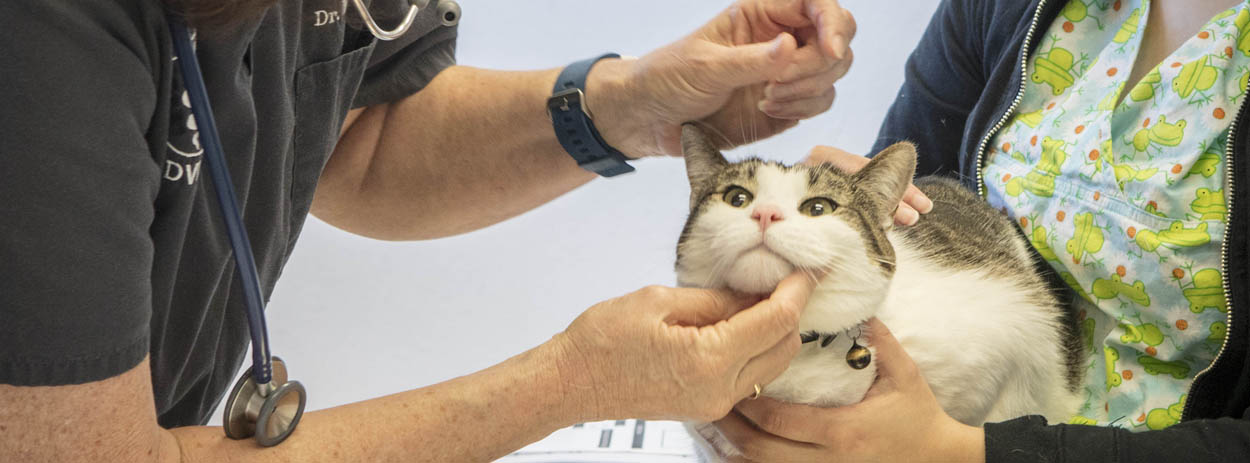How to Choose a Veterinarian
 Picking a vet is an important decision. A veterinarian should be your pet’s second-best friend, not just an expert on animal medicine. They’re the person you’ll be relying on to translate your pet’s situation to you, to provide information, and support you in your decision-making. Good veterinarians consider your needs as well as those of your pet, so it’s important to pick a pet doctor who’s good with people as well as animals. The worst time to look for a vet is when you really need one… so advance planning is highly recommended.
Picking a vet is an important decision. A veterinarian should be your pet’s second-best friend, not just an expert on animal medicine. They’re the person you’ll be relying on to translate your pet’s situation to you, to provide information, and support you in your decision-making. Good veterinarians consider your needs as well as those of your pet, so it’s important to pick a pet doctor who’s good with people as well as animals. The worst time to look for a vet is when you really need one… so advance planning is highly recommended.
Since vets often work closely with a team of professionals (like vet technicians and other qualified support staff), it’s best to evaluate the entire team’s competence and caring. If you think a veterinarian is terrific but don’t care for one of his/her staff, you may not be happy – animals (and owners) often spend more time with staff than with the vet. Sometimes a vet’s location may be convenient and the fees may suit your budget, but you don’t feel comfortable about some other aspect of the facility. Weigh the factors that are most important to you, but remember that you’ll probably be happier driving a bit further or paying a bit more to get the care you want for your beloved pet.
How Can I Find A Good Veterinarian?
The best way to find a good veterinarian is to ask people who share your preferences and priorities for pet care. Get recommendations from a like-minded friend, neighbor, animal shelter worker, dog trainer, groomer, boarding kennel employee, or pet sitter. Check the Yellow Pages under “Veterinarians” and “Animal Hospitals,” where important information may also be provided about hours, services, and staff.
Some veterinary hospitals are members of the American Animal Hospital Association (AAHA). AAHA membership means that the hospital has applied to the organization and met AAHA’s standards in the areas of facility, equipment, and quality care. Other veterinarians are board certified in a specific area(s) of veterinary medicine, like ophthalmology, surgery, or cardiology. This means they studied an additional two to four years in that specialty area and passed a rigorous examination.
Once you’ve narrowed your search to a few options, schedule a visit to meet the staff, tour the facility, and learn about the hospital’s philosophy and policies. This is a reasonable request that any veterinarian will be glad to oblige. Write down your questions ahead of time, and make sure you get them answered.
What Do I Look For?
We generally recommend pet owners consider the following important issues:
- Is the facility clean, comfortable, and well-organized?
- Are appointments required?
- How many veterinarians are in the practice?
- Are there technicians or other professional staff members?
- Are dog and cat cages in separate areas?
- Is the staff caring, calm, competent, and courteous, and do they communicate effectively?
- Do the veterinarians have special interests, such as geriatrics or behavior?
- Do their fees fit your budget?
- Are x-rays, ultrasound, bloodwork, EKG, endoscopy, and other diagnostics done in-house or referred to a specialist?
- Which emergency services are available?
- Are the office location and parking convenient for you?
How Can I Work Effectively With My Vet?
Learn what is normal for your pet so you recognize the first signs of illness, and see your vet regularly for preventive visits – not only when your pet becomes ill. If a pet is not well, don’t wait until she is really sick before calling the vet. It is frustrating for a vet – and heartbreaking for an owner – to see an animal die of an illness that could have been successfully treated if the owner had sought professional care sooner.
Schedule appointments, and be on time for them. For your pet’s safety – as well as that of other clients and pets – always bring your pet to the vet’s office on a leash or in a carrier.
Do not disturb your veterinarian during non-working hours for matters that can wait, and do not expect your veterinarian to diagnose a pet’s problem over the telephone.
What Should I Do When My Pet Has an Emergency?
Post your vet’s office’s number near your telephone for quick access. Even in emergency situations, call ahead to make sure that the veterinarian is available to see you. If they’re not, you’ll need to know the hours and location of an emergency veterinary facility. In Napa County, the closest emergency facilities are Solano – Napa Pet Emergency Clinic in Cordelia, and Animal Care Center in Rohnert Park.
It’s also smart to do a practice drive to your vet’s before you actually need to go there, so you don’t waste precious minutes trying to find it in an emergency.
How Can I Be a Responsible Pet Caregiver?
Keep your pet safe indoors. Adopt a pet for life. Prevent pet overpopulation and gain a happier, healthier pet by having your animal spayed or neutered. Choose a caring and competent veterinarian who will provide years of quality medical care for your beloved companion animal.
As a pet owner, you are ultimately responsible for your pet’s care. If you feel your needs as a client, or your pet’s needs as a patient are not being met, it may be time to find a new veterinarian. Keep in mind though, that many unpleasant situations are the result of misunderstandings that could be resolved through talking things out and looking for solutions. If you cannot resolve a fee or treatment dispute with your vet, you can contact the ethics and grievance committee of your local or state veterinary association, and/or the American Veterinary Medical Association. For serious issues of medical competence, you can file a formal complaint with the Veterinary Licensing Board in your state. You could also take up the matter as a civil suit with your attorney. Hopefully, however, you can avoid finding yourself in such circumstances by carefully and thoughtfully choosing your veterinarian.
Adapted from Humane Society of the United States. All rights reserved.























































